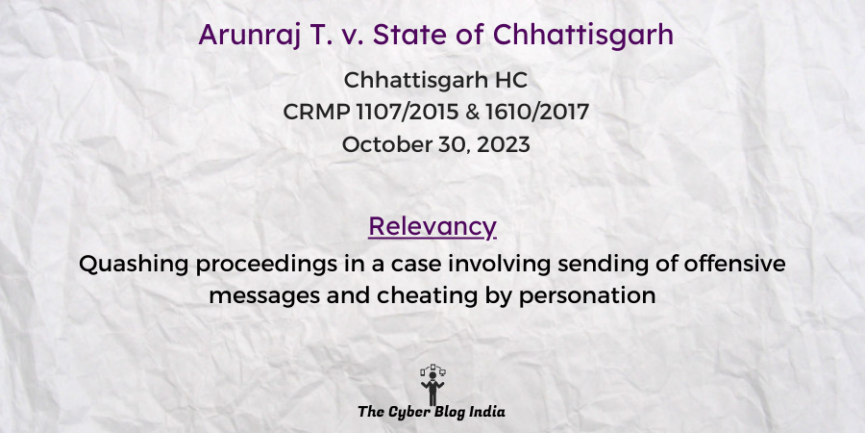Arunraj T. v. State of Chhattisgarh

Arunraj T. v. State of Chhattisgarh
In the High Court of Chhattisgarh
CRMP 1107/2015 & 1610/2017
Before Chief Justice Ramesh Sinha
Decided on October 30, 2023
Relevancy of the case: Quashing proceedings in a case involving sending of offensive messages and cheating by personation
Statutes and Provisions Involved
- The Information Technology Act, 2000 (Sections 66A, 66D, 66E)
- The Code of Criminal Procedure, 1973 (Sections 91, 156(3), 197, 482)
Relevant Facts of the Case
- The petitioners, in CRMP 1107/2015 and CRMP 1610/2017, have filed the petitions to quash the chargesheet for offences of sending offensive messages and cheating by personation.
- Both petitioners emailed a Rajya Sabha MP, who had written a transfer recommendation for the respondent to the Union Minister of Culture. The email contended that the respondent was a fraud and should not be transferred to Chhattisgarh.
- The email was forwarded to multiple other people by the name of Ravindra Sharma. The respondent found the email false and offensive and filed an FIR.
Prominent Arguments by the Advocates
- The petitioner’s counsel argued that:
- Action under Section 66A of the Information Technology Act, 2000 is unsustainable due to the Supreme Court’s decision in Shreya Singhal v. Union of India.
- Moreover, emailing from the ID of one “Ravindra Sharma” does not constitute cheating.
- Further, the petitioner is a government servant. Section 197 of the Code of Criminal Procedure, 1973 requires a sanction against him, which is not available in the present case.
- The respondent’s counsel submitted that additional evidence should be included in the record as it is pending before the court.
Opinion of the Bench
- The trial court can adjudicate on the issue of requiring a sanction under Section 197 while framing the charges.
- Proceedings concerning Section 66A of the Information Technology Act, 2000, should stand quashed.
- However, there is a prima facie case under Section 66D for impersonation.
Final Decision
- The court partly allowed the petitions.
Nandita Karan Yadav, an undergraduate student at the National Law Institute University, Bhopal, prepared this case summary during her internship with The Cyber Blog India in May/June 2024.
